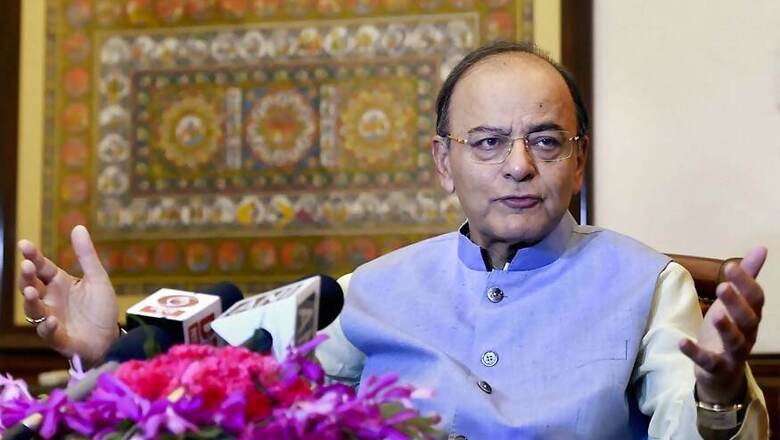
views
The proposal for the fifteenth Finance Commission was cleared by the Union Cabinet on Wednesday. Finance Minister Arun Jaitley in a media briefing after Cabinet meeting said, "The next step will be to finalize the members and chairperson of the finance commission after which it will start functioning."
The recommendations of the 14th Finance Commission, chaired by former Reserve Bank of India governor YV Reddy, are valid till 2020. Here’s a quick explainer on what Finance Commission is and its role in Indian economy.
What is Finance Commission?
Article 280 of the Constitution of India mandates the formation of a Finance Commission every five years, or earlier. The basic role of a Finance Commission is to come up with recommendations regarding allocation of tax proceeds that the Centre receives between the Union and the states and the allocation between the states of the respective shares of such proceeds.
Besides suggesting the mechanism to share tax revenues, the Commission also lays down the principles for rolling out grant-in-aid to states and other individual local bodies like municipal corporations.
Additionally, the commission has to address the imbalances that often arise between the taxation powers and expenditure responsibilities of the Centre and the states, respectively. Primarily, it has to ensure a sense of equality in public services across the states.
Narendra Modi government had begun the process of constituting the Finance Commission by allocating Rs 10 crore in the 2017-18 budget. Media reports suggest that former revenue and expenditure secretary, NK Singh is likely to head the commission, however, official confirmation is awaited.
The recommendations of the 15th Finance Commission will be implemented starting 1 April 2020. Normally, a finance commission is set up two years before the end of the period for which it sets rules for distribution of taxes.
Major Recommendation of Previous Finance Commission
For the period from April 1, 2015 to March 31, 2020, the 14th Finance Commission (FFC) was constituted in January 2013. It submitted the report on December 15, 2014.
One of the main recommendations that the last finance commission came up with was that of increasing the tax devolution rate to 42% from 32%. This means the Centre should allocate 42% of its tax revenue to states, largest ever. In the past, when Finance Commissions have recommended an increase, it has been in the range of 1-2%.
The last finance commission had YV Reddy, former governor of Reserve Bank of India, as its chairman. Members of the commission included Abhijit Sen member, Planning Commission, Sushama Nath, former union finance secretary, M Govinda Rao, director, National Institute for Public Finance and Policy and Sudipto Mundle, dormer acting chairman, National Statistical Commission. The body had Ajay Narayan Jha as its secretary.
Bold Faces In Previous Finance Commissions
When former RBI governor C Rangarajan took over as the chairman of the twelfth Finance Commission, the fiscal balance of both the Centre and states were deteriorating due to compliance issues of value added tax (VAT) and the states complaining of diminishing tax revenue due to the same.
The then chairman almost doubled the transfer of money from the Centre to the states from Rs 4.40 lakh crore in 2005 to Rs 7.55 lakh crore in 2010.
The fourteenth finance commission as mentioned also took sharp steps in favour of the states. There were reports also doing the rounds that the last commission did not work in unison and there was a letter of dissent from Planning Commission member, Abhijeet Sen.
















Comments
0 comment